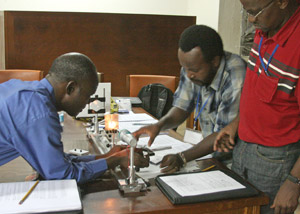
SPIE President Ralph James presented ALOP founder Minella Alarcon with a award from SPIE at SPIE Optics and Photonics in San Diego in August.
BELLINGHAM, Washington, USA -- The idea was a simple one: Use hands-on optics and photonics lessons to teach teachers more about science, and encourage them to share their knowledge with other teachers as well as their students.
The result: The UNESCO program ALOP (Active Learning in Optics and Photonics), headquartered in Paris, has created a means for enabling an exponential increase in the number of teachers with a better understanding of science, and an even larger number of students who are better prepared for life.
ALOP project leader and founder Minella Alarcon, who is retiring this year, was honored recently with an award from SPIE for her work and that of her organization in promoting science education. Since its inception in 2004, volunteers in the ALOP program have presented 13 workshops for more than 400 physics teachers in developing countries in Asia, Africa, and South and Central America.
In turn, these participants are encouraged to provide the training for others.
"A core group in Morocco have been very enthusiastic," Alarcon said in a recent interview. "Twelve high school teachers there have trained another 800 teachers. They work on Saturdays, on their own weekends, to do so."
The energy and motivation of the group in Morocco mirror that of Alarcon herself.
Before she came to UNESCO, Alarcon was a physics professor at Ateneo de Manila Univ. in the Philippines, and spent her Saturdays volunteering in teacher training programs.
When she joined UNESCO in 1998, inquiry-based, active-learning methodology and a resurgent interest in physics education research were combined in a UNESCO physics education network in Asia.
"It was a lot of fun," she said. "We worked all over -- Laos, Cambodia, Vietnam, India, Pakistan. People were so interested in knowing more. It was really quite inspiring."
In 2003, Alarcon brought the idea to create a similar program in optics and photonics to Gallieno Denardo at the Abdus Salam International Centre for Theoretical Physics (ICTP) in Trieste. With support from ICTP, SPIE, UNESCO, and other organizations, ALOP was launched.
The team of volunteer facilitators traveling with Alarcon to sites around the world includes Joel Maquiling and Ivan Culaba of Ateneo de Manila Univ. (Philippines), Alex Mazzolini of Swinburne Univ. of Technology (Australia), Zohra Ben Lakhdar of Univ. el Manar, Tunis (Tunisia), Vengu Lakshminaryanan of Univ. of Waterloo (Canada), David Sokoloff of Univ. of Oregon (USA), and Joseph Niemela of ICTP.
Part of what makes ALOP effective, Alarcon said, is that it is adaptable. Activities involve simple, inexpensive materials that, whenever possible, can be fabricated locally. An accompanying training manual -- now published in English and French with drafts in Spanish and Arabic on their way to publication -- includes an assessment instrument to measure student learning of optics concepts.
Optics is used as subject matter because it is relevant as well as adaptable to research and educational conditions in many developing countries.
The need is still great, Alarcon said. A 2007 report by the UNESCO Institute of Statistics estimated that an additional 1.9 million more teachers would be needed around the world by 2015.
An open-access paper on the ALOP model presented by Alarcon at SPIE Optics and Photonics in August is available in the SPIE Digital Library.
Photon caption, at right, above: Teachers participate in a 2008 workshop in Cameroon.
SPIE, the international society for optics and photonics, was founded in 1955 to advance light-based technologies. Serving more than 180,000 constituents from 168 countries, the Society advances emerging technologies through interdisciplinary information exchange, continuing education, publications, patent precedent, and career and professional growth. SPIE annually organizes and sponsors approximately 25 major technical forums, exhibitions, and education programs in North America, Europe, Asia, and the South Pacific, and supports scholarships, grants, and other education programs around the world.
###
Media Contact:
Amy Nelson
Public Relations Manager
amy@spie.org
Tel: +1 360 685 5478
Twitter.com/SPIEtweets
Facebook.com/SPIE.org
LinkedIn.com/SPIE Group
YouTube.com/SPIE.org
###